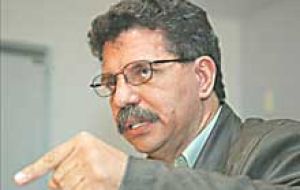MercoPress. South Atlantic News Agency
Another Venezuelan ambassador on the tight rope
 Ambassador Julio Montes
Ambassador Julio Montes With mounting tension between the Bolivian government and four of the country's nine provinces pressing for regional autonomy, Venezuela's ambassador caused a political seism when he admitted the possibility of sending Venezuelan troops in support of the administration of President Evo Morales.
In an interview with La Paz daily La Razón, Ambassador Julio Montes said that according to a bilateral agreement in defense affairs, Venezuelan Armed Forces can operate in Bolivia if the "reform process" advanced by the administration of President Morales is "imperiled". "We'll do what Bolivia requests. And if they request, then we will consider it", said the ambassador when asked about the bilateral defense agreement that was passed by the Bolivian Congress a couple of weeks ago and contemplates the support of Venezuela to quell mounting unrest against President Morales. But Ambassador Montes statement was rejected by members of the opposition and from the ruling coalition. "Completely out of place", blasted former Conservative president Jorge Quiroga who added it was "repugnant" that Venezuela feels it can "chaperon" Bolivia. "This puts our democracy at risk; it's an attack on our sovereignty and independence". Javier Zavaleta from Morales MAS movement and president of the Lower House Defense Committee said "it was a most unfortunate statement, when the country is going through critical moments there was no need to add fuel to the fire". Zavaleta pointed out that the bilateral defense agreement with Venezuela only covers "the academic field, conflict scenarios and the exchange of officers at that level". President Morales and the opposition are at odds over the drafting of a new constitution and "reform" legislation in the elected 255 member Constituent Assembly. The opposition demands the government keeps to the original promise of a two thirds majority for its approval, while the ruling coalition insists on simple majority (50% plus one) According to press sources in La Paz Ambassador Montes is currently in Venezuela following the publication of the interview earlier this week. This is not the first incident with Venezuelan ambassadors in Latinamerica. Roger Capella was called back from Buenos Aires to Caracas following revelations he had been involved in promoting support for Iran, whose former leaders have been accused by Argentine prosecutors of involvement in the worst terrorist attack, dating back to 1994 and which killed almost a hundred people. The Venezuelan ambassador in Chile was also removed some months ago when he inferred that the Christian Democrats, members of the ruling coalition, back in 1973 passively supported the military coup of deceased General Augusto Pinochet. In Mexico and Peru, Venezuelan president Chavez alleged meddling in internal affairs led to strong verbal exchanges and even insults with leaders from the two countries, and the mutual withdrawal of ambassadors. However following the recent regional summit in Bolivia, Venezuela's Chavez and Peru's Alan Garcia smoked the peace pipe and agreed to "normalize" relations.




Top Comments
Disclaimer & comment rulesCommenting for this story is now closed.
If you have a Facebook account, become a fan and comment on our Facebook Page!